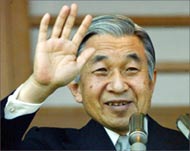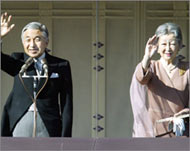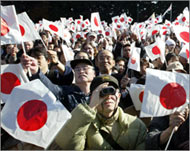Japanese divided on succession issue
The suggestion that Japan may soon have an empress clearly offends Kohei Yokoyama’s right-wing sensibilities.

No matter that Japan’s imperial family faces extinction because there are no male heirs to take on the duties of emperor beyond Crown Prince Naruhito.
“We are a patriots’ group and we accept that we are facing a problem with the future of the emperor because there is no one to take on the position after the present emperor and prince, but a woman is not the answer,” the secretary-general of Issuikai, which means One Water Society, said.
Nationalist, traditionalist and outspoken, Issuikai was linked to an incendiary bomb found outside an apartment on a United States Embassy housing facility in Tokyo when president George Bush Sr visited Japan in January 1992.
The group branded Bush a “war criminal” and threatened to attack the US Embassy.
Changes proposed
Among the largest of around 800 ultra-nationalist organisations in Japan, in recent years Issuikai has largely been content to vent its spleen against China, Russia and North Korea in its publications and from black trucks flying the Rising Sun flag and blaring out martial music from loudspeakers.
Now, however, it is having to focus its attentions closer to home as an advisory panel debates rewriting the 1947 Imperial Household Law to allow a woman to claim the throne.
If the changes go ahead, three-year-old Princess Aiko, the daughter of Crown Prince Naruhito and Princess Masako, will become second in line to the throne.
 |
|
Emperor Akihito marked his 71st |
“Yes, there have been empresses in the past, but they were all ‘pinch-hitters’ and it could not be helped at the time,” Yokoyama said, using baseball terminology to describe the eight women who have ruled Japan.
All were temporary solutions who were replaced by their closest male relatives as soon as they were old enough. None of the empresses’ children were permitted to reign.
“It is our tradition to follow the male blood line, that of the first emperor, Jinnu, and there is another solution other than allowing a woman to rule,” Yokoyama said.
“Instead of the government panel considering a female, it should reverse another part of the 1947 law that abolished 11 branches of the family tree,” he said.
“Those families became commoners, although they still obviously have imperial blood. And they have sons. They should be brought back into the imperial family and become next in line to the throne.”
Endangered dynasty
Leaving aside Yokoyama’s apparent attitude towards women, he does have a valid point. If the Allied occupation authorities had not ordered that the imperial family be shorn, there would have been plenty of candidates for the position.
Nearly half a century later, however, a dynasty that is, according to legend, descended from the sun goddess Amaterasu and the Emperor Jinnu, who was born some 2600 years ago, is in danger of petering out.
The advisory panel’s recommendations are to be presented to Prime Minister Junichiro Koizumi in September.
|
“It is our tradition to follow the male blood line, that of the first emperor, Jinnu, and there is another solution other than allowing a woman to rule” Kohei Yokoyama, secretary-general of Issuikai, a Japanese ultra-nationalist group |
It is widely believed that the panel will propose that the law be altered in favour of an empress, with legislation likely to be submitted to the Diet early next year.
The Japanese public has embraced the idea of an empress, with 79% supporting a change in the law in a recent poll in the right-leaning Yomiuri newspaper. A mere 4% continue to hold out against a female figurehead.
Alongside the nationalist groups are a number of right-wing politicians in the Diet who would much rather have an emperor than a female ruler, although their recent silence on the matter suggests they realise they could be digging their own political graves if they should publicly state their beliefs.
Attempts to speak with members of the ruling Liberal Democratic Party who are known to be hawks have been ignored, although Shinzo Abe, party secretary-general has indicated the reluctance that exists in some quarters.
Historical meaning
“There were reigning empresses in the past, but the throne has never been passed on to their children, not even once,” Abe said on a television talk show in June last year as public debate began.
“We must fully think of the historical meaning attached to the imperial family, which is our nation’s identity in our indigenous tradition and culture.”
Members of the ultra-conservative Imperial Household Agency – truly the power behind the Japanese throne – have also waded into the controversy.
 |
|
Emperor Akihito has put a modern |
“Frankly speaking, as grand steward of the Imperial Household, I want them to have another child,” Toshio Yuasa, director general of the agency, said recently. That possibility is looking less likely as Princess Masako has reportedly had problems conceiving.
Yuasa later went on to say that Prince Naruhito’s younger brother, Prince Akishino, should attempt to have a third child. He already has two daughters.
That argument is also advocated by right-wing writer Masaaki Shinomiya. “The crown prince could still have a son and heir, and he still has a younger brother who could produce an heir, so I think the government is acting too hastily by pushing these decisions now,” he said.
“This will be very important for Japanese history and I don’t know why they think they have to rush into it.”
Deeply traditional
The remaining element ranged against Princess Aiko’s accession is the deeply traditional Shinto religion, which until the end of World War II insisted that the population consider the emperor to be a deity.
“It is a very important question and we must think very hard about the issue before reaching a decision,” Takashizu Sato, a spokesman for the Association of Shinto Shrines, said.
“It is not easy for us to say what we believe should happen as we do not have a position. We cannot say that we support an empress or that we do not support that proposal.”
|
“There were reigning empresses in the past, but the throne has never been passed on to their children, not even once” Shinzo Abe, secretary-general, |
But away from the balancing act that the religion’s leaders are performing – at least publicly – there are indications of their true attitudes.
“Of course there are some within Shinto who oppose the idea of an empress because they simply want to keep the male line of inheritance of the throne intact,” Yoshimi Umeda, of the International Shinto Research Institute, said.
“Even the empresses of the past were all of the male line and effectively served as regents.”
In the 126 generations of Japan’s imperial family, the most recent female ruler was Go-Sakuramichi, who ruled between 1762 and 1771 before abdicating in favour of her nephew.
Change predicted
“What is clear is that there will definitely be a change in the law, and probably within the next 12 months,” Pema Gyalpo, a professor of law and constitutional issues at Yokohama University, said.
“It would not mean a major change in the constitution, just to the Imperial Household Law, and that would be a very straightforward process after the proposal is made to the prime minister and debate begins.
 |
|
Japan’s imperial family continues |
Gyalpo continued: “The mood in the Diet and the country at large is for change as both the ruling parties and the opposition support it – clearly it is not in their best interests to express opposition – so the only real issue is that whether the change is in favour of the first child that is born taking the throne or whether a son should be given priority.”
He added: “It’s just my feeling, but I do not feel that Japan is ready to go with the first child, male or female. I think they will opt for a first step of priority towards a son.”
But Gyalpo, a Tibetan academic who is the only foreigner to have advised the Japanese government on constitutional reform, confirms there is an undercurrent that is opposed to an empress. And that their ideas are being listened to.
Future battles
 |
|
A mere 4% of Japanese remain |
“It seems to me that momentum within the prime minister’s panel seems to have been lost,” Gyalpo said.
“There is resistance from some within the panel, as well as nationalist groups and religious organisations.
They want to reinstate some of the families who were removed from the imperial household after the war and that’s why discussions are taking longer.
“I don’t think that will be the recommendation that is made later in the year, but they are clearly examining it.”
She is far too young to know of the problems that have threatened to envelop her parents and the institution that is Japan’s imperial family, but Princess Aiko will almost certainly face some battles of her own in the future.